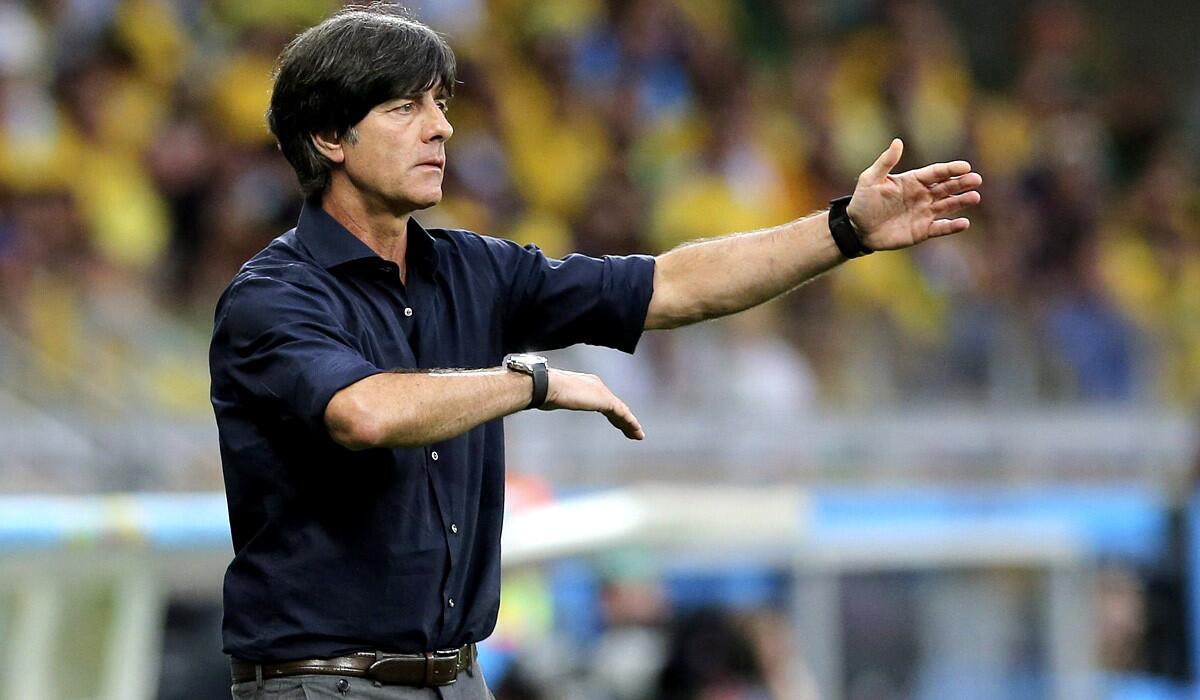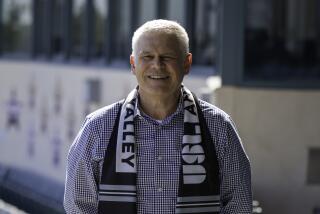German coach is under pressure at World Cup

Reporting from Rio de Janeiro — This should be the greatest moment of Joachim Loew’s life.
On Sunday he will be coaching in a World Cup final for the first time, leading his favored German team against Argentina. Every soccer coach who has ever blown a whistle has dreamed of being exactly where he is now.
Yet Loew looks as if he’d rather be anywhere else.
The most memorable picture of the German coach from this World Cup shows a solitary figure, in sunglasses and earplugs, walking aimlessly along a beach. In a country of 200 million people, Loew preferred to be alone with his thoughts.
He has gone from being a club coach who lost three jobs in as many years to the pinnacle of his sport in just 10 years. He should be celebrating –- and celebrated.
Instead he’s taking lonely walks on the beach, weighed down by the enormous pressure of the task at hand.
There’s only one result possible for Loew on Sunday: He must win.
Germany, after all, has finished second before, most recently in 2002. And it finished third in 2006 and 2010. Add in this year and Germany is the only country in history to make the semifinals of four consecutive World Cups.
Close is no longer good enough for Germany — which has finished second or third in more World Cups (eight) than any two other countries combined. And Germany’s passionate, knowledgeable and demanding fans have let Loew know that only a title will do this time.
Germany hasn’t gotten any of those in 24 years, the country’s longest drought since World War II. Its last title in any major tournament came in the 1996 European Championship.
“Every kind of special generation had a title on their chest. This is now what this generation is about,” U.S. Coach Juergen Klinsmann, who played on Germany’s last World Cup champion, said in the run-up to this tournament. “They have to understand that compliments here and there, it’s nice getting compliments. But it’s also nice to win a trophy at the end of the day because that will change your life forever.”
The 1954 German team came out of nowhere to upset Hungary’s seemingly invincible “Mighty Magyars” in a Swiss monsoon, giving Germany its first World Cup in a result so surprising it was called “The Miracle of Bern.”
Twenty years later an All-Star team that included goalkeeper Sepp Maier, captain Franz Beckenbauer and forward Gerd Mueller rallied to upset a Dutch team led by Johan Cruyff. And then, in 1990, Beckenbauer coached a team led by Klinsmann, Lothar Matthaus and Rudi Voller to another title.
Three golden generations, three World Cup championships. Yet this generation — the empty-handed generation — may be the most talented of them all.
In goal, Loew has Manuel Neuer, considered by many to be the best keeper in the world. Forward Miroslav Klose is the German national team’s most prolific scorer ever — and the leading scorer in World Cup history as well — while captain Philipp Lahm is the most capped defender in German history.
The Germans can also call on forward Thomas Mueller, who led the last World Cup in goals and assists, and midfielder Bastian Schweinsteiger, who not only has the coolest name on the roster but who also made the all-tournament team in 2010.
Yet for all that individual talent, which produced a 7-1 victory over Brazil in the semifinals, it’s a group that has won nothing as a team.
“Jogi knows that,” said Klinsmann, who plucked Loew off the sidelines of an Austria club in 2004 and made him an assistant coach with the German national team. Two years later, Germany finished third in the World Cup, Klinsmann stepped aside, and Loew became his successor.
He has won nearly 70% of his games since then. But none of them have come in the final of a major tournament.
“Jogi knows that OK, he took over for me in 2006, that’s eight years now,” Klinsmann said. “He’s got to deliver.”
If he does, it will be the greatest moment of his life. And there won’t be a beach in the world where he’ll be able to walk alone.
Twitter: @kbaxter11






